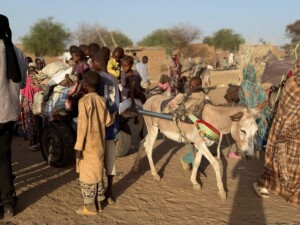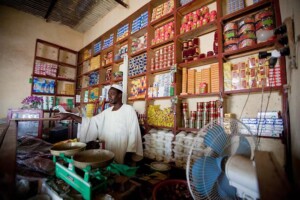Economist warns for ‘dire consequences’ of Sudan’s political tensions
Economic expert Hasan Bashir has warned for the negative effects of the current political tensions on the domestic economy, as well as foreign investments. In Khartoum, school lessons have temporarily been brought back to four hours daily because of the scarcity of bread. The Ministry of Trade has set up arrangements with neighbouring countries to transport import goods over land.
 A ship near Port Sudan (SUNA)
A ship near Port Sudan (SUNA)
Economic expert Hasan Bashir has warned for the negative effects of the current political tensions on the domestic economy, as well as foreign investments. In Khartoum, school lessons have temporarily been brought back to four hours daily because of the scarcity of bread. The Ministry of Trade has set up arrangements with neighbouring countries to transport import goods over land.
Dr Hasan Bashir, Professor of Economics at El Nilein University in Khartoum said in an interview with Radio Dabanga yesterday that the political tensions between the military and civilian components of the Sudanese government, in addition to the continued protest actions in eastern Sudan, will have dire economic consequences for the country.
He called the recent developments “dangerous” as they have a negative impact on Sudan's reputation. The weeks-long closure of the sea ports and main roads in Red Sea state by Beja protestors has already brought huge losses to exporters and importers.
The barricades have also led to a scarcity of basic commodities, such as flour and fuel, in the country – causing a severe shortage of bread in the capital, where the authorities on Monday decided to shorten the school days to four hours only. A large number of private companies has been forced to decrease the production.
Professor Bashir considered the stability of the exchange rate despite the political instability “a positive indicator”. He attributed this to the economic reforms earlier this year, in addition to the lack of imports due to the blocking of the ports. “Yet, if the current situation continues, it may lead to a fall of the Sudanese Pound.”
The alternative use of Egyptian land ports for import will affect the revenues of the Sudanese sea ports. The increased transport costs will lead to higher prices, which will push inflation figures to new highs, he warned.
Discord, barricades
Following an aborted coup attempt on September 21, tensions between Sudanese military and civilian leaders resurfaced. The military accused the civilian politicians of quarrelling over positions while civilian members of the government criticised the military leaders for claiming “the sole right” to lead the country through the transitional period”.
At the end of last month, South Sudan, France, and the USA sent high-level envoys to Khartoum to pressure the disputing parties to continue their cooperation during the 39-month transitional period. On October 2, thousands of people in Sudan took to the streets in support of the democratic transition in the country, calling for the establishment of a civilian government.
September also witnessed large protest actions in eastern Sudan. The High Council of Beja Nazirs and Independent Chieftains opted for these actions to put more pressure on the Sudanese government to cancel the Eastern Sudan Track protocol in the Juba Peace Agreement. Protestors have been blocking the main roads in Red Sea state, including the Khartoum-Port Sudan highway, railway lines since September 17. Most of the sea ports also remain closed up to now.
In late September, a group of activists in Khartoum filed a lawsuit against the Beja leaders, based on charges concerning the undermining of civil state authority, inciting hatred, and sabotaging the national economy. The Ministry of Transport and Infrastructure reported in early October that the closure of Red Sea state's Southern Port has already cost the Sudanese treasury “large sums”.
Alternative ports
Prime Minister Abdallah Hamdok said in a press briefing following the daily meeting of the Council of Ministers on Wednesday that “the economic reforms are no longer easy to influence, though overall indicators are still stable despite what the country has been going through during the past few weeks, in various states [in eastern Sudan] and the political crisis [in Khartoum]”.
Minister of Trade Ali Jido said that the closure of Port Sudan ports has led to the opening of more land ports. “The search for alternative ports was necessitated by the obligations many import companies have with other countries”.
Imported goods will now reach Sudan via seaports in neighbouring countries: Ein Sukhna and Alexandria in Egypt, Benghazi in Libya, and Massawa in Eritrea. “An agreement has been signed with Northern State on Thursday, to allow import of goods through the border with Egypt,” the Minister explained. In the west, goods will be imported through Chad at West Darfur border crossings, and through Libya via Mellit in North Darfur.
The Ministry will encourage transit trade with Ethiopia, South Sudan, and the Central African Republic as well.











 and then
and then